
European Physical Journal H
Scope & Guideline
Bridging History and Innovation in Physical Sciences
Introduction
Aims and Scopes
- Historical Analysis of Physics:
EPJ H emphasizes the historical development of physical theories, often examining pivotal moments and figures in the history of physics, such as the contributions of Niels Bohr and Albert Einstein. - Philosophical Implications:
The journal explores the philosophical dimensions of physics concepts, including discussions on determinism, the nature of scientific progress, and the interpretation of quantum mechanics. - Interdisciplinary Approaches:
The journal encourages interdisciplinary studies that connect physics with other fields such as mathematics, history, and philosophy, fostering a comprehensive understanding of scientific advancements. - Contextualization of Modern Theories:
EPJ H places contemporary developments in physics within a historical framework, helping to contextualize modern theories like quantum mechanics and relativity through their historical evolution. - Focus on Key Figures and Events:
The journal frequently highlights the lives and works of significant physicists, as well as important historical events that have shaped the field, providing readers with insights into the human aspect of scientific discovery.
Trending and Emerging
- History of Quantum Mechanics:
Recent publications increasingly focus on the history of quantum mechanics, exploring foundational issues and the evolution of key concepts, which is critical for understanding current debates in quantum theory. - Interdisciplinary Studies:
There is a growing trend toward interdisciplinary research that integrates history, philosophy, and physics, enhancing the dialogue between these fields and fostering a more holistic view of scientific development. - Cultural and Social Context of Physics:
Emerging themes include the cultural and social dimensions of physics, examining how historical events, such as World War II, influenced scientific progress and the development of theories. - Biographical Studies of Physicists:
An increase in biographical studies focusing on prominent physicists and their contributions highlights the human narratives behind scientific advancements, providing a richer context for understanding their work. - Historical Perspectives on Contemporary Issues:
The journal is increasingly addressing contemporary scientific challenges through historical perspectives, offering insights into how past theories and debates can inform current research directions.
Declining or Waning
- Technical Advances in Physics:
There appears to be a waning focus on purely technical advancements in physics, such as detailed experimental techniques or computational methods, as the journal increasingly prioritizes historical and philosophical discussions. - Contemporary Physics Theories:
Topics related to the latest developments in contemporary physics, such as breakthroughs in particle physics or advancements in condensed matter physics, are less frequently covered, as the journal leans more towards historical retrospectives. - Historical Figures Outside Mainstream Physics:
The exploration of lesser-known figures in physics history is becoming less prominent, suggesting a shift towards more universally recognized contributors whose impact on modern physics is more widely acknowledged. - Empirical Studies:
There is a noticeable decrease in empirical studies or experimental results being presented, indicating a preference for theoretical and historical analyses over new experimental findings.
Similar Journals
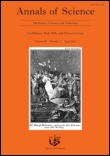
ANNALS OF SCIENCE
Fostering Scholarly Discourse on Science's LegacyANNALS OF SCIENCE, published by Taylor & Francis Ltd, is a pivotal journal in the field of the History and Philosophy of Science, as evidenced by its Q3 categorization and a respectable Scopus rank of 99 out of 223, placing it in the 55th percentile among its peers. With a rich history dating back to its initial publication in 1936, the journal has made significant contributions to scholarly discourse, providing a platform for researchers and academics to explore the intricate connections between scientific developments and philosophical inquiries. The journal's commitment to rigorous academic research ensures that it remains a vital resource for professionals, educators, and students dedicated to understanding the evolution of scientific thought. Although it operates under traditional subscription models, the journal's importance in shaping modern scientific discussions cannot be overstated, making it an essential read for those engaged in the multifaceted study of science's history and philosophical implications.

History of Geo- and Space Sciences
Exploring the rich tapestry of geo-science history.History of Geo- and Space Sciences is a distinguished open-access journal published by COPERNICUS GESELLSCHAFT MBH since 2010, committed to advancing knowledge in the interdisciplinary fields of Earth and planetary sciences as well as the history and philosophy of science. Based in Germany, this journal operates under ISSN 2190-5010 and E-ISSN 2190-5029, providing a platform for researchers, professionals, and students to disseminate and access high-quality scholarly articles. With a remarkable impact reflected in its 2023 Scopus rankings, placing it in Q3 for Earth and Planetary Sciences (miscellaneous) and Q2 for History and Philosophy of Science, the journal plays a crucial role in fostering dialogue and collaboration among the scientific community. It not only covers significant advancements in geo-sciences but also addresses historical perspectives and philosophical inquiries that shape our understanding of the discipline. Engage with groundbreaking research and broaden your insights by contributing to or reading articles from this pivotal journal.
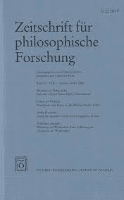
ZEITSCHRIFT FUR PHILOSOPHISCHE FORSCHUNG
Illuminating Complex Philosophical Issues with Rigorous Scholarship.ZEITSCHRIFT FUR PHILOSOPHISCHE FORSCHUNG is a prestigious academic journal published by Vittorio Klostermann GmbH in Germany, dedicated to the interdisciplinary field of philosophy. With its ISSN 0044-3301 and E-ISSN 1439-2615, this journal has made significant contributions to the philosophical discourse since its inception in 1977, continuing its pursuit of excellence in scholarship through 2024. Recognized in the 2023 category quartiles as Q2 in Philosophy, it is ranked #498 out of 806 in the Arts and Humanities' Philosophy classification by Scopus, placing it in the 38th percentile. Although it currently does not offer open access options, its rigorous peer-reviewed articles serve to enrich the scholarly community's understanding of complex philosophical issues. ZEITSCHRIFT FUR PHILOSOPHISCHE FORSCHUNG plays a vital role in advancing philosophical research in a collaborative academic environment, making it a valuable resource for researchers, professionals, and students alike.

Journal for General Philosophy of Science
Shaping the Future of Philosophical Discourse in ScienceJournal for General Philosophy of Science, published by Springer, stands as a pivotal resource in the fields of History and Philosophy of Science, as well as general Philosophy. With an impressive Q1 ranking in its categories and a solid reputation reflected in its Scopus rankings, this journal provides a robust platform for scholarly discourse and advancement in philosophical inquiry regarding science. The journal's commitment to quality is evident, catering to researchers, professionals, and students interested in the critical examination of scientific methods, theories, and their implications. While it operates on a subscription basis, the journal is dedicated to fostering a deeper understanding of philosophical issues surrounding scientific practices from 1980 through 2024. Operating out of the picturesque Netherlands, specifically from VAN GODEWIJCKSTRAAT 30, 3311 GZ DORDRECHT, the journal continues to encourage innovative thinking and interdisciplinary dialogue, underscoring its significance in academia today.
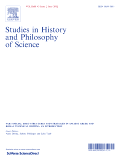
STUDIES IN HISTORY AND PHILOSOPHY OF SCIENCE
Fostering Insightful Dialogues on Science's Philosophical FoundationsSTUDIES IN HISTORY AND PHILOSOPHY OF SCIENCE, published by Elsevier Science Ltd, is a leading academic journal dedicated to the exploration of historical and philosophical dimensions of science. With both an ISSN of 0039-3681 and E-ISSN of 1879-2510, this esteemed journal has established itself as a pivotal resource since its inception in 1970 and continues to publish cutting-edge research reflecting the evolution of scientific thought. Situated in the United Kingdom, it is recognized for its high-impact contributions, boasting a Q1 ranking in both History and History and Philosophy of Science categories as of 2023. Researchers in the humanities will benefit from the journal’s rigorous analysis and insightful discussions, as evidenced by its competitive Scopus rankings—placing it in the 96th and 83rd percentiles in their respective fields. Although not an open-access journal, it maintains a commitment to scholarly excellence, aiming to foster a deeper understanding of the interconnections between historical context and philosophical inquiry in the scientific domain, making it an invaluable resource for students, professionals, and researchers alike.
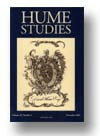
Hume Studies
Engaging with the Philosophical Giants: Hume StudiesHume Studies, published by the Hume Society, is an esteemed journal dedicated to the exploration and analysis of the philosophical works of David Hume, offering a platform for scholars to engage with contemporary and historical interpretations of his thought. With an ISSN of 0319-7336 and E-ISSN 1947-9921, this journal plays a pivotal role in the field of philosophy, particularly focusing on Hume's influence on modern philosophical discourse. Although currently listed as a Q4 journal in the 2023 category of Philosophy in Scopus rankings, its contributions to the understanding of Humean philosophy remain invaluable for researchers and professionals alike, stimulating ongoing dialogue and critical inquiry within the academic community. Scholars can access the journal at Occidental College, Department of Philosophy, in Los Angeles, California, paving the way for innovative discussions that bridge historical and contemporary philosophical issues. While the journal operates under a subscription model, its significance in shaping philosophical thought ensures it is a vital resource for anyone engaged in serious philosophical study.
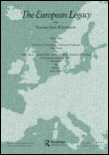
European Legacy-Toward New Paradigms
Fostering Innovative Perspectives on Europe's PastEuropean Legacy-Toward New Paradigms is a distinguished academic journal published by Routledge Journals, Taylor & Francis Ltd, focusing on interdisciplinary approaches to cultural studies, history, and philosophy. With an ISSN of 1084-8770 and an E-ISSN of 1470-1316, this journal has made significant contributions to the understanding of European heritage and its impact on contemporary thought and society since its inception in 2001. It currently holds a Q3 ranking in Cultural Studies, History, and Philosophy, reflecting its relevance and scholarly impact within the academic community. Although not an Open Access journal, European Legacy provides valuable insights and research findings through its carefully curated articles, making it an essential resource for researchers, professionals, and students alike. The journal's commitment to exploring new paradigms fosters critical dialogue and encourages innovative perspectives on Europe’s complex legacies, thereby positioning itself as a vital platform for ongoing academic discourse.

European Journal for Philosophy of Science
Connecting Ideas, Inspiring Innovation in Scientific PhilosophyThe European Journal for Philosophy of Science, published by SPRINGER, stands as a prestigious platform for scholars in the realms of philosophy and history of science. With an impressive impact factor and categorized in the Q1 Quartile for both History and Philosophy of Science and Philosophy, this journal ranks among the top 10% of its peers, reinforcing its critical role in advancing academic discussions and insights within these fields. With its composition of rigorous peer-reviewed articles and a commitment to fostering interdisciplinary dialogue, the journal navigates foundational and contemporary issues that shape scientific inquiry. Although currently not Open Access, it provides invaluable access to researchers, professionals, and students who seek to deepen their understanding of the philosophical underpinnings of scientific practice. Housed in the Netherlands, the journal continuously engages with the evolving landscape of philosophy in the scientific domain, making it a key resource for anyone invested in the intersection of science and philosophy.

Bollettino di Storia delle Scienze Matematiche
Unveiling the Philosophical Roots of Mathematical SciencesBollettino di Storia delle Scienze Matematiche, published by FABRIZIO SERRA EDITORE, stands as a vital platform for the exploration of the rich history and philosophical underpinnings of mathematical sciences. With its origins tracing back to 2003, this journal primarily serves as an interdisciplinary forum where historians, philosophers, and mathematicians converge, reflecting the complex interplay between mathematics and its historical context. Although classified within the Q4 quartile for both the History and Philosophy of Science and Mathematics categories in 2023, the journal continues to stimulate critical discourse and encourage new avenues of research that challenge traditional narratives. While it is not an open-access publication, it is recognized for its scholarly rigor and contributes essential insights to the academic community, particularly those engaged in the nuanced study of mathematical practices through time. Researchers, professionals, and students alike will find valuable resources within its pages to inform their inquiries and broaden their understanding of the historical trajectory of mathematical thought.
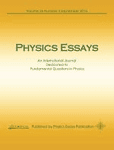
PHYSICS ESSAYS
Challenging Paradigms, Inspiring InnovationPHYSICS ESSAYS, published by PHYSICS ESSAYS PUBLICATION, serves as a unique and influential platform within the field of Physics and Astronomy. With an ISSN of 0836-1398 and an E-ISSN of 2371-2236, this journal fosters the dissemination of innovative ideas and rigorous research, encouraging contributions that challenge conventional paradigms. Although the journal's Scopus coverage has been discontinued since 2017, it continues to uphold its legacy of scientific inquiry with a focus on pivotal developments in the discipline, garnering a Scopus rank within the 15th percentile. The journal, based in Ottawa, Ontario, Canada, invites submissions that are reflective of its broad scope in experimental, theoretical, and applied physics, appealing to a diverse audience of researchers, professionals, and students alike. While it operates on a non-open access model, the journal remains an essential resource for those seeking to navigate the complexities of modern physics.